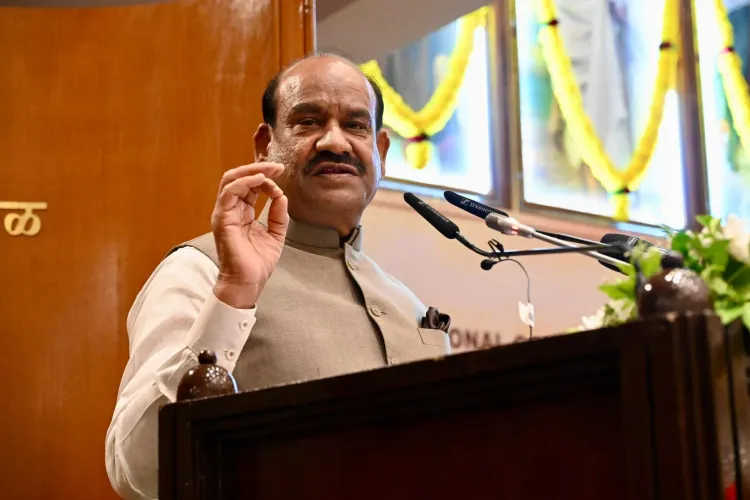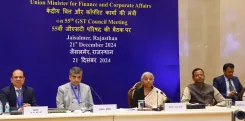How Can the Estimates Committee Enhance Government Fund Management and Fiscal Discipline?

Synopsis
Key Takeaways
- Estimates Committee needs a robust mechanism for financial discipline.
- Integration of AI is crucial for enhancing transparency.
- Training camps will be organized for better understanding of AI.
- Approximately 90-95% of recommendations by the committees are accepted.
- Committees act as a check on government spending.
Mumbai, June 23 (NationPress) Lok Sabha Speaker Om Birla emphasized on Monday that the Estimates Committee in both Parliament and state assemblies must develop a strategy in the near future to enhance financial discipline, transparency, and the prudent allocation of government funds to align with the aspirations and expectations of the populace.
Delivering his inaugural remarks at a two-day national conference of Estimates Committees from Parliament and State/Union Territory Legislative Bodies held at the Maharashtra Legislature, Speaker Birla pointed out the necessity for these committees to integrate artificial intelligence (AI) into their operations, in light of the rapid technological advancements, and to improve the quality of their reports.
While unveiling the 75th Anniversary Souvenir of the Estimates Committee of Parliament, he noted that training sessions will be organized for committee members and staff to promote the use of AI, thereby enhancing transparency in the effective use of public funds, which will significantly benefit the community.
He further mentioned that both Parliamentary and state-level Estimates Committees should not only embrace evolving technologies but also adopt best practices to improve their operational efficiency.
According to the Speaker, the Estimates Committee, functioning as a 'mini-Parliament', has been instrumental in minimizing financial irregularities, promoting transparency, accountability, and ensuring better governance.
“Approximately 90 to 95 percent of the recommendations made by the Parliamentary Estimates Committee and state-level committees have been accepted, and these committees have played a significant role in reducing corruption and reforming the accounting system,” he stated.
He asserted that the conference of the Chairpersons of the Estimates Committees represents a collective commitment towards better governance.
The Estimates Committee reviews the budget estimates presented to Parliament and state legislatures, scrutinizing budgetary allocations to various government ministries and departments, along with their actual spending and performance.
Maharashtra Chief Minister Devendra Fadnavis remarked that the Estimates Committee has a critical role in monitoring government operations.
He highlighted the importance of the committee system in democratic governance and noted that in Maharashtra, around 65 to 70 percent of the recommendations are executed, with the remaining 30 percent pending implementation.
He further pointed out that these committees influence government operations through their recommendations.
Deputy Chief Minister Eknath Shinde commented on the essential role of parliamentary and legislative recommendations in executing various public welfare initiatives, even amid financial challenges.
Maharashtra Legislative Council Chairman Ram Shinde expressed his dissatisfaction with the lack of discussions and debates regarding various committees, advocating for a revival of such dialogues in the future.
Maharashtra Assembly Speaker Rahul Narwekar stated that the Estimates Committee reports provide a thorough analysis of executive budgetary activities, urging the Executive to seriously consider these reports to create a balanced, effective, and welfare-centric budget.
Maharashtra Legislative Council Deputy Chairperson Neelam Gorhe affirmed that enhancing the prestige of legislatures requires a unified approach in committee work, transcending partisan divides.
Maharashtra Legislature Estimates Committee Chairman Arjun Khotkar declared that legislative committees act as mini legislatures and play a vital role in the state's progress.








